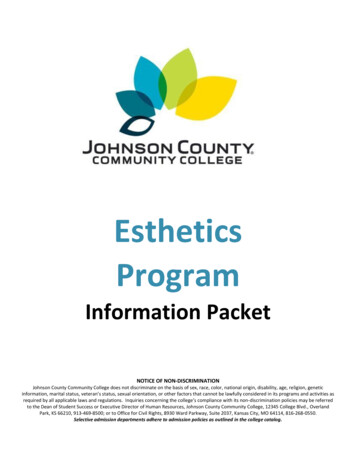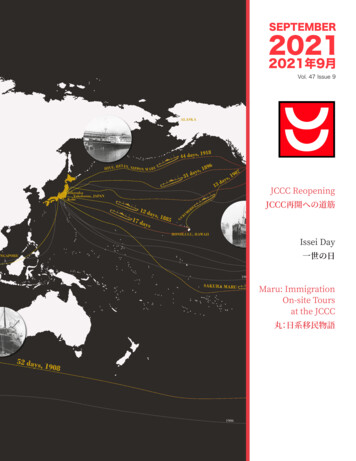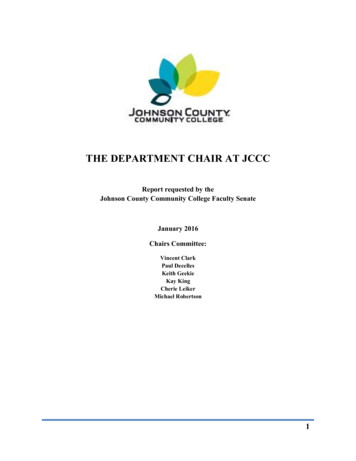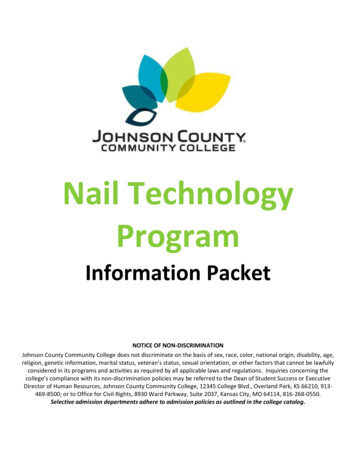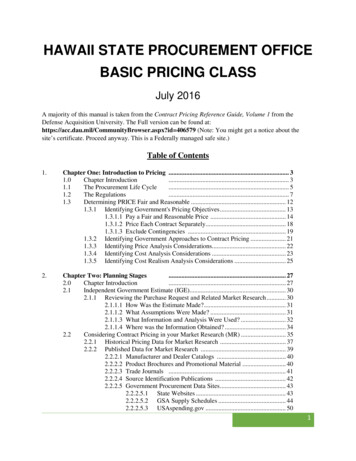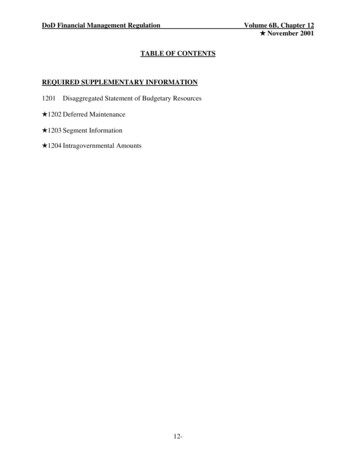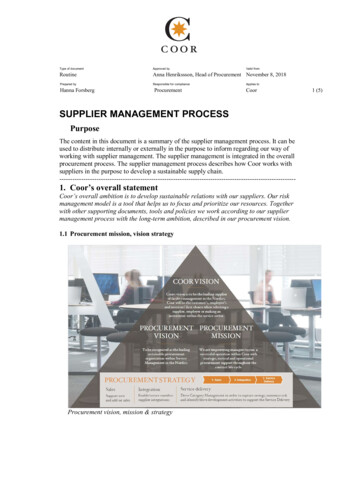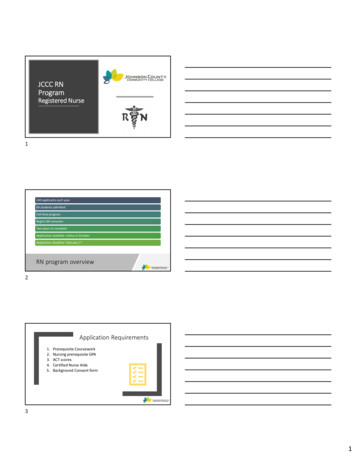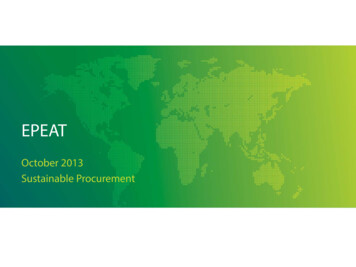
Transcription
EPEATOctober 2013Sustainable Procurement
What is EPEAT?EPEAT has come to be the definitive global registry for greenerelectronics over the past 7 years.Designed to help everyone who purchaseselectronics—from consumers to enterprises—evaluate, compareand select products that reduce environmental impactContains 3,000 productsfrom60 manufacturersinPRESENTATION TITLE Copyright 2011 Green Electronics Councilwww.epeat.net42countries
User Benefits – Simplicity and UniformityFor PurchasersA single, credible environmental performance rating to efficientlyaddress lifecycle environmental issues in purchasing specificationsacross electronic product categoriesFor IndustryConsistent environmental performance criteria for design of productsand related services across multiple geographies. Opportunity formarket recognition for design and service strategies that reduceproducts’ environmental impact.PRESENTATION TITLE Copyright 2011 Green Electronics Council
What products does EPEAT cover?Currently: PC/DisplayImaging equipmentTelevisionsUp next:ServersMobile phonesProduct ENTATION TITLE Copyright 2011 Green Electronics Council
A Lifecycle ApproachPRESENTATION TITLE Copyright 2011 Green Electronics cussion/
How are products rated in EPEAT? Products must meet all required criteria to qualify for EPEAT. Required criteria identify high environmental performance Products are rated Bronze, Silver or Gold based on howmany optional criteria they meet,Green ( 50%)Greener (50-75%)Greenest ( 75%)Ratings are granted automatically by system software based on declarationPRESENTATION TITLE Copyright 2011 Green Electronics Council
Collective Purchasing Power153 Colleges and Universities with an institution-widestated preference to purchase EPEAT Silver orhigher PCs and DisplaysTotal reported expenditure on EPEAT Gold rated productsby STARS participants in 2012 265,647,739 60,495,270 Total reported expenditure on EPEATSilver rated products by STARS participants in 2012PRESENTATION TITLE Copyright 2011 Green Electronics Council
Representative Purchaser Users National Governments US, Canada, Australia, France,Poland, New Zealand, Singapore, Brazil, Costa Rica (Scotland) States/Provinces CA, CO, MA, ME, MI, MN, NY, OH, OR, PA,VT, WA, WI; Provinces of BC, NS, ON, QU; WarwickshireCounty (UK), Minas Gerais (Brazil), WSCA and USCommunities collaboratives Cities San Francisco, Phoenix, San Jose, Vancouver, Seattle,Portland OR, LA County, Culver City CA, Keene NH, Leeds, UK Enterprise Catholic Healthcare West, Charles Schwab,Deutsche Bank, Fairmount Hotels, Ford Motor Company,HDR, HSBC, Kaiser Permanente, KPMG, Marriott, McKesson,Microsoft, NBC-Universal, Nike, Saint Gobain, SocieteGenerale, TescoListing is for informational purposes only and does not imply endorsementPRESENTATION TITLE Copyright 2011 Green Electronics Council
Higher Education PurchasersAgnes Scott College, Alfred State University, American University, Anne Arundel Community College, Appalachian State University,Arizona State University, Auburn University, Babson College, Ball State University, Bard College, Baylor University, Bellevue College,Berea College, Boston University, Bowdoin College, Brandeis University, Brunswick Community College, California State University Channel Islands, California State University – Monterey Bay, Carnegie Mellon University, Central Carolina Community College, ClarksonUniversity, Cleveland State University, Colgate University, College of Lake County, Colorado State University, Columbia University,Concordia University, Cornell University, Delta College, DePaul University, Dickinson College, Dominican University of California, DukeUniversity, East Tennessee State University, Eastern Connecticut State University, Eastern Iowa Community College, Elon University,Emory University, Estrella Mountain Community College, Fleming College, Florida Gulf Coast University, Frostburg State University,Furman University, George Mason University, Georgia Institute of Technology, Green Mountain College, Harrisburg Area CommunityCollege, Haverford College, Hokkaido University, Humber College, Humboldt State University, Illinois Central College, Ithaca College,Keene State College, King’s University College, Lawrence University, Loyola Marymount University, Luther College, Macalester College,Middlebury College, Mills College, Missouri State University, Missouri University of Science and Technology, Moraine Valley CommunityCollege, Mount Holyoke College, Muhlenberg College, New Mexico State University, New York University, North Carolina StateUniversity, North Seattle Community College, Northern Arizona University, Oberlin College, Okanagan College, Orange CountyCommunity College, Oregon Institute of Technology, Oregon State University, Pacific Lutheran University, Pacific University,Pennsylvania State University, Portland State University, Princeton University, Rio Salado College, Saint Louis University, Scripps College,Sewanee, Slippery Rock University, Southern Oregon University, Stanford University, State University of New York, The Evergreen StateCollege, The New School, The University of Arizona, Towson University, Transylvania University, Truman State University, TuftsUniversity, University of Colorado at Colorado Springs, University of Wisconsin, University of Buffalo, University of Alaska, University ofCalgary, University of California - Los Angeles, University of California – Merced, University of California – Riverside, University ofCalifornia – San Diego, University of California – Santa Barbara, University of California – Irvine, University of Colorado – Denver,University of Connecticut, University of Denver, University of Florida, University of Houston, University of Illinois, University of Iowa,University of Louisville, University of Massachusetts Amherst, University of Michigan, University of Missouri –Columbia, University ofMissouri – Kansas City, University of Mount Union, University of Nebraska at Kearney, University of Nevada – Las Vegas, University ofNew Hampshire, University of North Carolina at Chapel Hill, University of Northern British Columbia, University of Northern Iowa,University of Notre Dame, University of Oregon, University of Puget Sound, University of Saskatchewan, University of South Carolina,University of South Florida, University of Texas at Arlington, University of Virginia, University of Washington, University of Wisconsin,Valencia College, Virginia Commonwealth University, Washington University in St. Louis, Wellesley College, Western KentuckyUniversity, Western Washington University, Westminster College, Yale University.PRESENTATION TITLEListing is for informational purposes only and does not imply endorsement Copyright 2011 Green Electronics Council
Environmental BenefitsIthaca College 2012 – 2013 School Year Reductions in EnvironmentalImpact Through Greener Electronics Purchasing 485,374 kWh of Electricity, enough to power 38 US households for a year16,008 lbs of solid waste, equal to the annual solid waste generation of 4 UShouseholds369,600 lbs of primary materials, equal to the weight of 5 tractor-trailer 18wheelers2,358 lbs of hazardous waste, equivalent to the weight of 9 refrigerators206,353 lbs of toxic materials, equal to the weight of 18 bricks296 metric tons of CO2, equivalent to removing 58 average US passengercars from the road for a year321 metric tons of air emissions1 metric ton of water emissions 49,384 in energy cost savingsPRESENTATION TITLE Copyright 2011 Green Electronics Council
Get Involved: EPEAT Purchasing, Recognition Update campus-wide purchasing policies to specify EPEAT– A turnkey decision; you may purchase many products already– Model policy/RFP language is available online and/or upon request– Require existing vendors to supply EPEAT registered products Promote your college’s EPEAT-Related purchasing results– Report your annual purchases, publicize the environmental benefits– Use your benefits calculations for sustainability reporting– Position your school as environmental leader in media outreach andcase studies– Become an EPEAT Purchaser to gain recognition Earn AASHE STARS Points– Earn points for having an institution-wide stated preference to purchaseEPEAT PCs and Displays– Earn points for tracking expenditures on EPEAT registered electronicsPRESENTATION TITLE Copyright 2011 Green Electronics Council
How to get started? Communicate with vendors Existing contracts:– Ask vendors to provide you with EPEAT registration status of theproducts you currently buy– Tell them you prefer to purchase EPEAT registered products– Ask them to provide registered product alternative suggestions for anyproducts you buy that are not registered New Solicitations:– Use Plug and Play contract/RFP language on EPEAT website– Tell vendors you do not expect to pay a premium for EPEAT– Require reporting on EPEAT product status for all sales, so you cancalculate environmental benefits!PRESENTATION TITLE Copyright 2011 Green Electronics Council
Contact informationAndrea Desimone, Program Support ah O’Brien, Director of Stakeholder Engagementsobrien@greenelectronicscouncil.org503 279 9383www.epeat.nettwitter: @EPEATPRESENTATION TITLE Copyright 2011 Green Electronics Council
485,374 kWh of Electricity, enough to power 38 US households for a year 16,008 lbs of solid waste, equal to the annual solid waste generation of 4 US households 369,600 lbs of primary materials, equal to the weight of 5 tractor -trailer 18 wheelers 2,358 lbs of hazardous waste, equivalent to the weight of 9 refrigerators 206,353 lbs of toxic materials, equal to the weight of .
